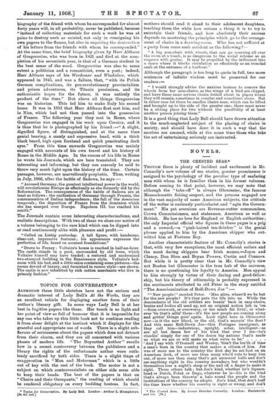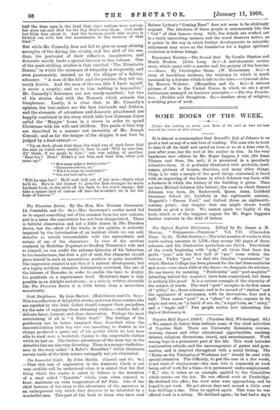NOVELS.
THE CRESTED SEAS.*
THOUGH there is plenty of incident and excitement in Mr. Connolly's new volume of sea stories, greater prominence is assigned to the psychology of the peculiar type of seafaring men with whom he is familiar than in his former volume. Before coming to that point, however, we may note that although the " take-off " is always Gloucester, the famoue
Massachusetts fishing seaport, and the persons engaged are in the vast majority of cases American subjects, the attitude of the writer is curiously particularist and " agin the Govern- ment." His pet aversions are Revenue-cutter commanders, Crown Commissioners, and statesmen, American as well as British. He has no love for England or English authorities ; the only Imperial official who figures in these pages is a prig and a coward,—a "pink-haired tea-drinker" is the genial phrase applied to him by the American skipper who out- witted him at Fortune Bay.
Another characteristic feature of Mr. Connolly's stories is that, with very few exceptions, the most efficient sailors and the most daring skippers bear Irish names,—Joyce and Clancy, Dan Shea and Bryan Powers, Curtin and Connors. But while it is pretty clear that in Mr. Connolly's view not Boston but Gloucester is the true hub of the universe, there is no questioning his loyalty to America. Men appeal to him strongly by virtue of their daring and good-fellow- ship, but his theory of citizenship is probably expressed in the sentiments attributed to old Peter in the story entitled "The Americanization of Roll-Down Joe " :—
'‘ New people !' snorted Peter. 'Kan alive, where'd we be but for the new people ? It's they puts the life into us. While the descendants of the old settlers are leanin' back in easy-chairs, brains and bodies all used up, not an original notion left in 'em —from overwork, or overworry, or too much fat livin', or what- ever 'tis that's ailin' them—it's the new people are coming along and gettin' things goin' again. Look right here in Gloucester now—is it the new blood, or the old, that's mannin' the fleet ? And this same Roll-Down Joe—this Portugee immigrant, as they call him—industrious, upright, sober, intelligent—al are all but damn few of his kind that ever I see—he's standin' simply for one of the dozen big nations that's made us what we are or will make us what we're to be.' . . . . . 'And I say with O'Donnell and Wesley, lista the len'th of time a man's been in the country that makes a citizen of him. Joe was of more use to the country the first day he set foot on en American dock, of more use than many who'd vote to keep him out, of more use than many that's got ancestral halls and don't see anything right in the country nowadays, but who wouldn't themselves lose a night's sleep or the nail off a finger to make it right. Those others talk ; but Joe's kind, whether he's Square. head or Dutch, Polak or Dago, whatever he is—his is the kind that's always been throwin' a halo round the people and the institutions of the country he adopts. Joe's kind, that don't half the time know whether his country is right or wrong, and don't * The Crested Seas. By James Brendan Connolly. London: Dackwortt. and Co. [es.]
half the time care, is the kind that since nations were nations has gone out and died for the flag that's over them. And made but little fuss about it. And the horizon, you'll take notice, is blotted out with but few monuments to the memory of that kind."
But while Mr. Connolly does not fail to give us many shining examples of the daring, the rivalry, and the skill of his sea- dogs, his portrayal of their reflective, imaginative, and
domestic moods lends a special interest to this volume. One of the most striking studies is that entitled "The Illimitable
Senses," in which the existence of telepathy is eloquently, and even passionately, insisted on by the skipper of a fishing- schooner. "A man of the hills and the prairies, they tell me, rarely doubts. And the man of the sea, this I know myself. is never a sceptic ; and so to him nothing is impossible." Mr. Connolly's fishermen are not mealy-mouthed ; but two of his stories deal with the Nemesis which attends the blasphemer. Lastly, it is clear that, in Mr. Connolly's opinion, the best sailors are the best husbands and fathers, and the elements of adventure and domestic attachment are happily combined in the story which tells how Coleman Joyce bailed the 'Maggie' home in a storm in order to spend Christmas with his wife and children. The perils of that trip are described in a manner not unworthy of Mr. Joseph Conrad ; and as for the temper of the skipper, it can best be judged by a final extract :—
" Up on deck, about that time, the wind was of such force that the men on watch were unable to face it, and Will he ease her, d'y' think, if we speak to him ? ' one was asking of another. Ease her ? Him? Didn't y' see him, and hear him, when you came up ? '
" How many miles to Dublin town ? " "Threescore and ten, sir."
"Will I be there by candlelight ? " " Yes, and back again, sir."
Will he ease her ? He'll welt hell out of her now—that's what he'll do. He's in the humor to give the first stranger he meets his bank book, or the shirt off his back to his worst enemy ; but take a square inch of canvas off her—he wouldn't do it for his hope of heaven.' "











































 Previous page
Previous page